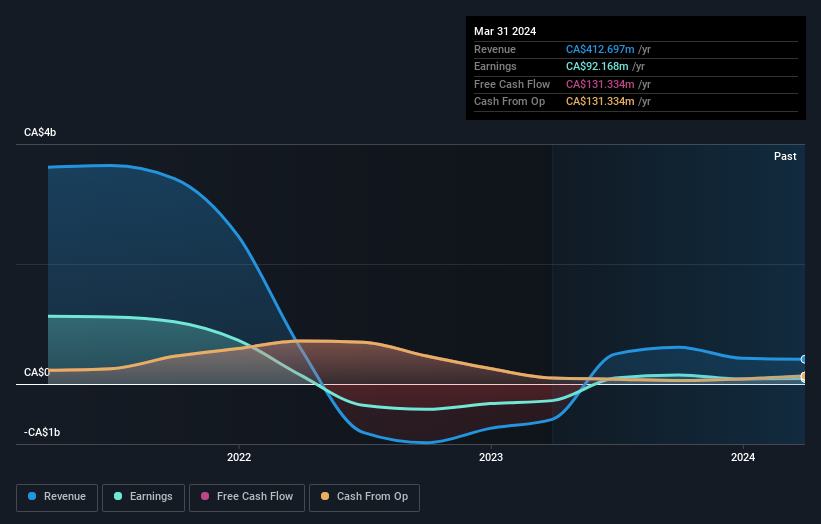With 63% ownership in Senvest Capital Inc. (TSE:SEC), insiders continue to have the largest holding even though they have sold shares recently
Key Insights
Insiders appear to have a vested interest in Senvest Capital's growth, as seen by their sizeable ownership
A total of 2 investors have a majority stake in the company with 59% ownership
To get a sense of who is truly in control of Senvest Capital Inc. (TSE:SEC), it is important to understand the ownership structure of the business. We can see that individual insiders own the lion's share in the company with 63% ownership. That is, the group stands to benefit the most if the stock rises (or lose the most if there is a downturn).
Despite recent sales, insiders own the most shares in the company.
Let's take a closer look to see what the different types of shareholders can tell us about Senvest Capital.
Check out our latest analysis for Senvest Capital
What Does The Lack Of Institutional Ownership Tell Us About Senvest Capital?
Institutional investors often avoid companies that are too small, too illiquid or too risky for their tastes. But it's unusual to see larger companies without any institutional investors.
There are multiple explanations for why institutions don't own a stock. The most common is that the company is too small relative to funds under management, so the institution does not bother to look closely at the company. It is also possible that fund managers don't own the stock because they aren't convinced it will perform well. Senvest Capital's earnings and revenue track record (below) may not be compelling to institutional investors -- or they simply might not have looked at the business closely.
We note that hedge funds don't have a meaningful investment in Senvest Capital. The company's CEO Victor Mashaal is the largest shareholder with 48% of shares outstanding. Richard Mashaal is the second largest shareholder owning 11% of common stock, and George Malikotsis holds about 2.9% of the company stock. Interestingly, the second-largest shareholder, Richard Mashaal is also Senior Key Executive, again, pointing towards strong insider ownership amongst the company's top shareholders.
A more detailed study of the shareholder registry showed us that 2 of the top shareholders have a considerable amount of ownership in the company, via their 59% stake.
While it makes sense to study institutional ownership data for a company, it also makes sense to study analyst sentiments to know which way the wind is blowing. Our information suggests that there isn't any analyst coverage of the stock, so it is probably little known.
Insider Ownership Of Senvest Capital
While the precise definition of an insider can be subjective, almost everyone considers board members to be insiders. The company management answer to the board and the latter should represent the interests of shareholders. Notably, sometimes top-level managers are on the board themselves.
I generally consider insider ownership to be a good thing. However, on some occasions it makes it more difficult for other shareholders to hold the board accountable for decisions.
It seems that insiders own more than half the Senvest Capital Inc. stock. This gives them a lot of power. That means they own CA$487m worth of shares in the CA$770m company. That's quite meaningful. Most would argue this is a positive, showing strong alignment with shareholders. You can click here to see if those insiders have been buying or selling.
General Public Ownership
With a 37% ownership, the general public, mostly comprising of individual investors, have some degree of sway over Senvest Capital. While this group can't necessarily call the shots, it can certainly have a real influence on how the company is run.
Next Steps:
It's always worth thinking about the different groups who own shares in a company. But to understand Senvest Capital better, we need to consider many other factors. Case in point: We've spotted 2 warning signs for Senvest Capital you should be aware of, and 1 of them is a bit unpleasant.
Of course, you might find a fantastic investment by looking elsewhere. So take a peek at this free list of interesting companies.
NB: Figures in this article are calculated using data from the last twelve months, which refer to the 12-month period ending on the last date of the month the financial statement is dated. This may not be consistent with full year annual report figures.
Have feedback on this article? Concerned about the content? Get in touch with us directly. Alternatively, email editorial-team (at) simplywallst.com.
This article by Simply Wall St is general in nature. We provide commentary based on historical data and analyst forecasts only using an unbiased methodology and our articles are not intended to be financial advice. It does not constitute a recommendation to buy or sell any stock, and does not take account of your objectives, or your financial situation. We aim to bring you long-term focused analysis driven by fundamental data. Note that our analysis may not factor in the latest price-sensitive company announcements or qualitative material. Simply Wall St has no position in any stocks mentioned.

 Yahoo Finance
Yahoo Finance 

